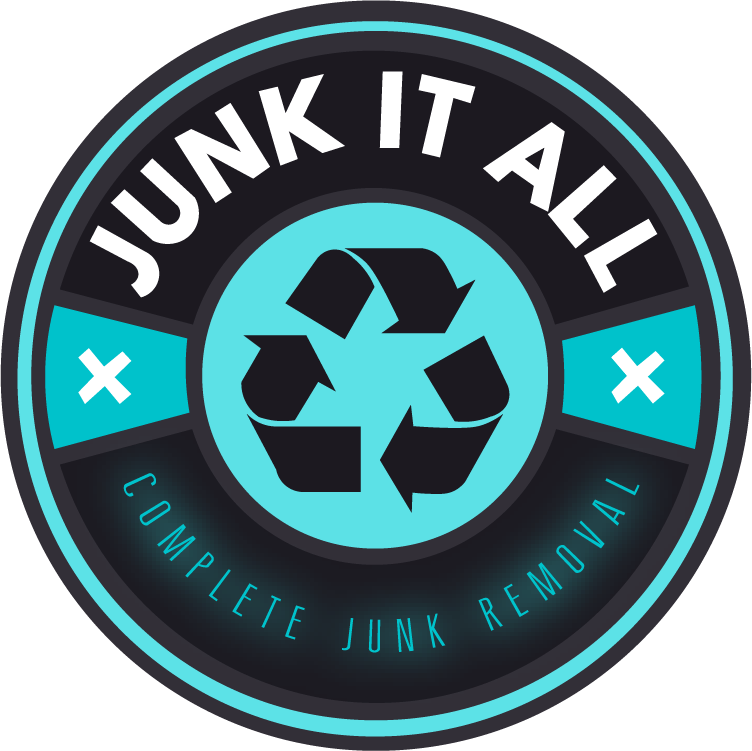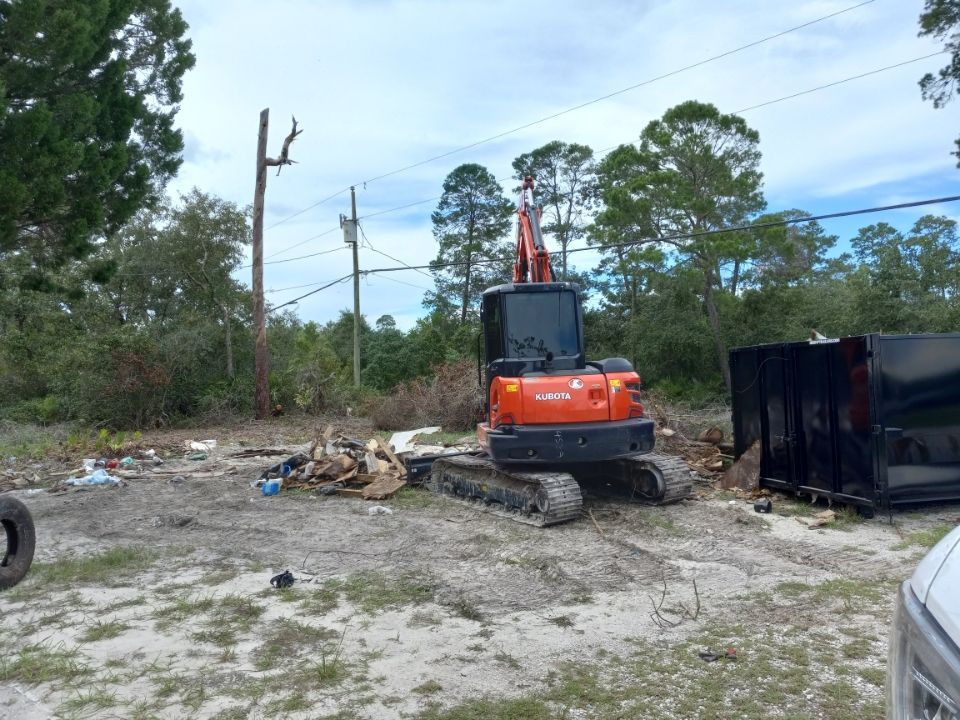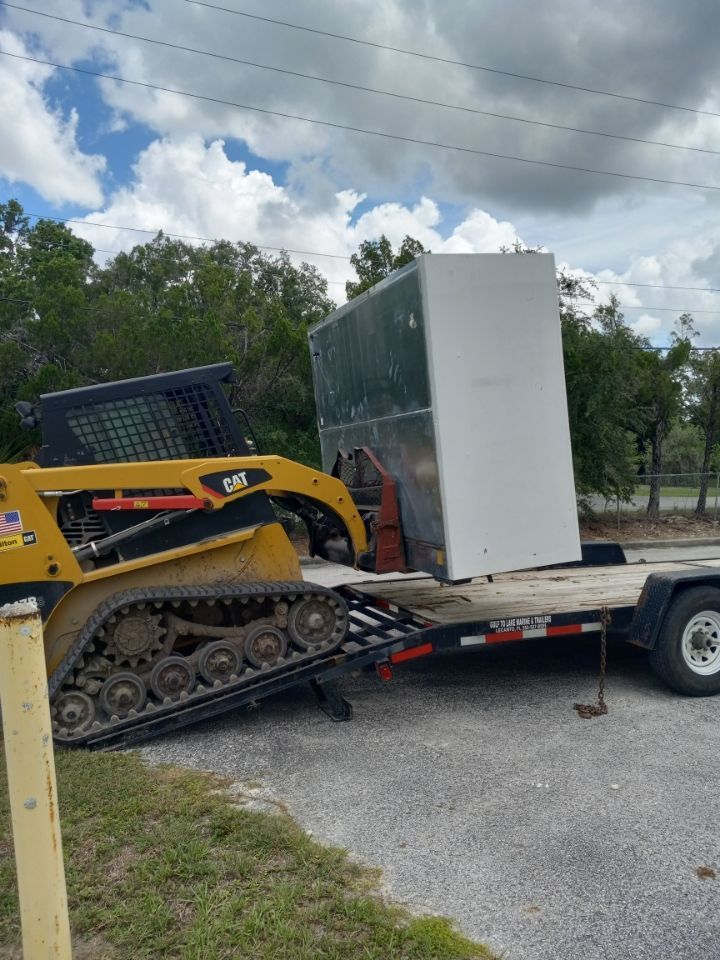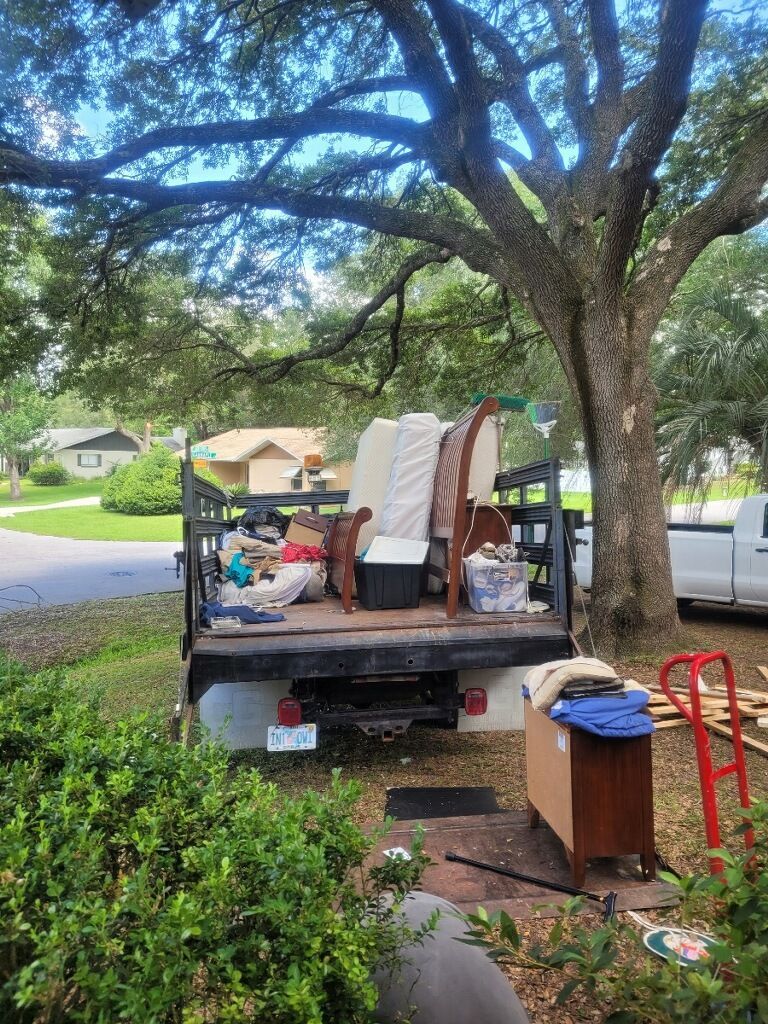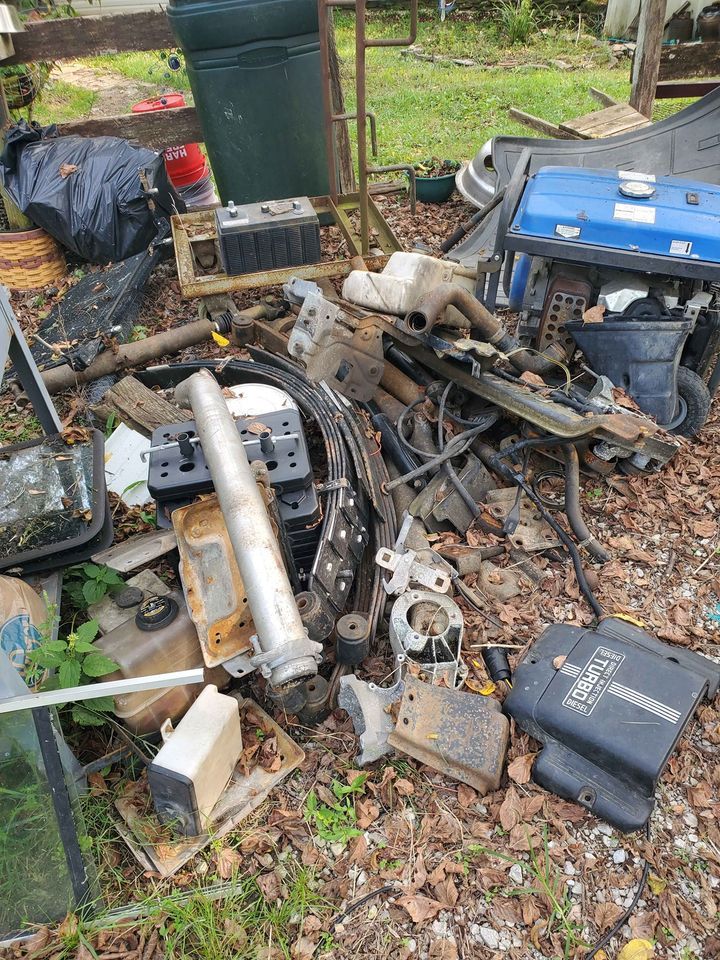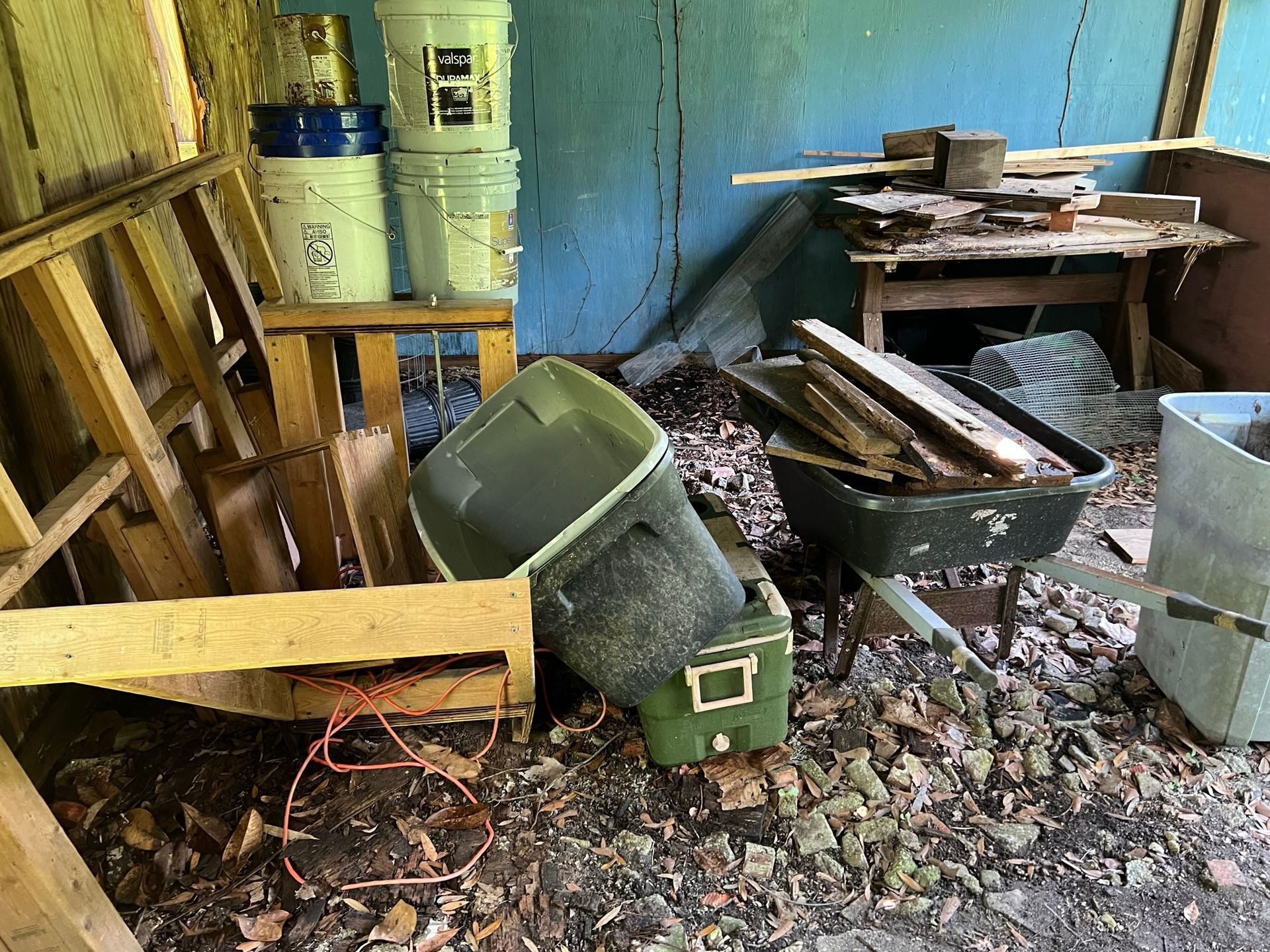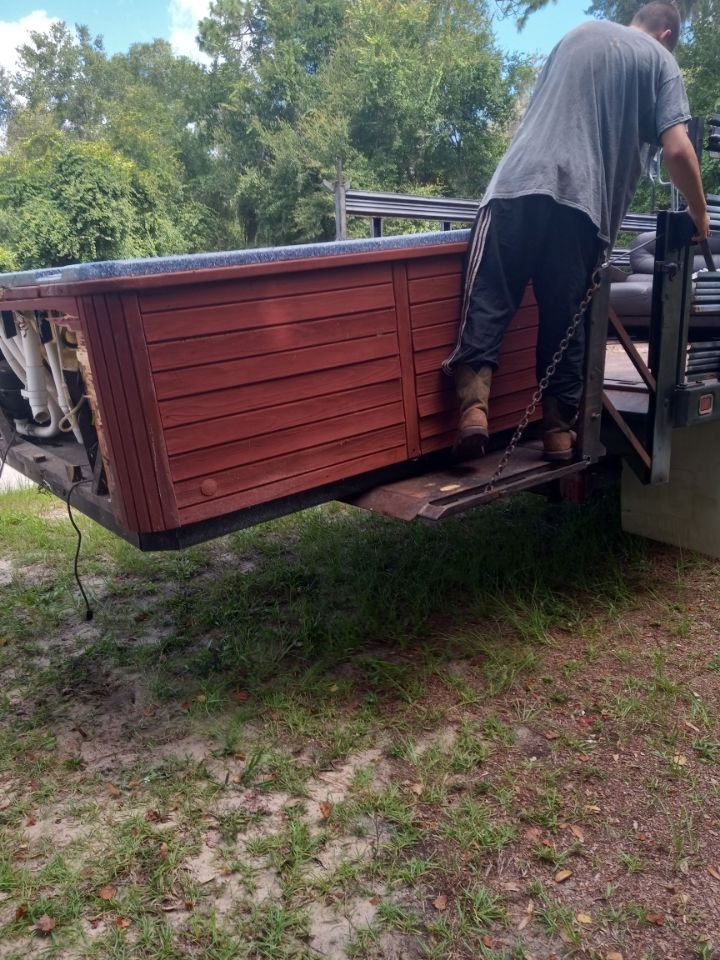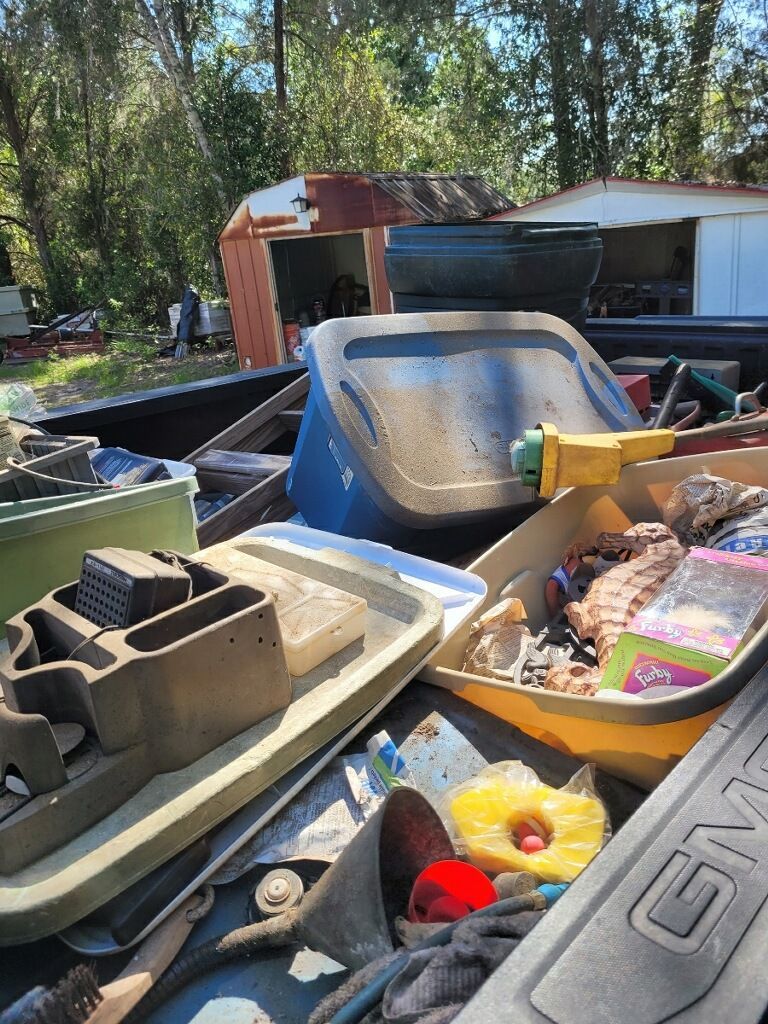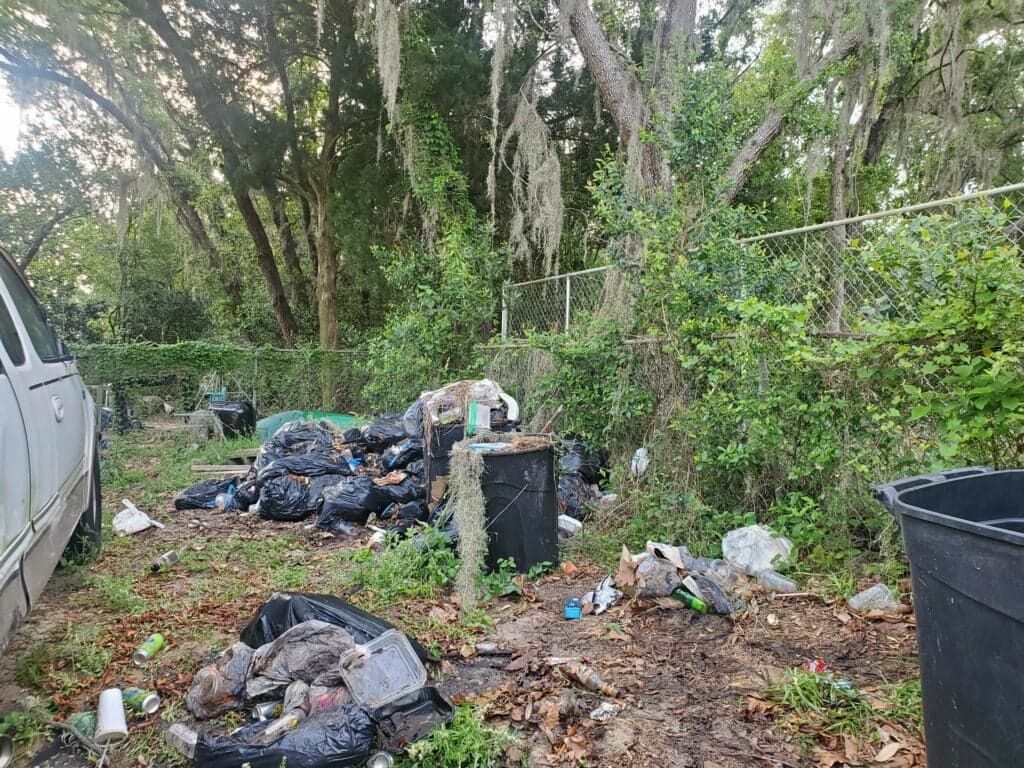Electronics Recycling in Florida: How to Save Devices and the Planet
Ever had a moment when you found an obsolete electronic device, like that flip phone from 2005, or the bulky monitor sitting in your attic? Chances are it's sent a wave of nostalgia over you, or perhaps made you think – "What do I do with this ancient relic?" With the rapid evolution of technology, Florida is facing an ever-growing pile of e-waste - but don't worry, there's a solution! This post will show you how Electronics Recycling in Florida is not only helping you clear out your space but also contributing to saving our planet. Read on to find out how you can efficiently declutter your life and be an eco-warrior!
At Junk It All Services, we provide electronics recycling services for various cities in Florida, including Inverness Highlands North. To request a quote, customers can text us a photo of their item(s) at 352-737-1301. Our team handles almost every type of junk and ensures that all electronic waste is recycled or donated whenever possible to help save the planet.
Florida Electronics Recycling Legislation and Programs
Electronic devices have revolutionized the world we live in, but these devices can have serious environmental consequences if they are not disposed of properly. Fortunately, Florida has put in place some legislation and programs aimed at encouraging electronics recycling across the state.
In 2010, Florida implemented an electronic waste recycling program that requires manufacturers to establish a collection system for their electronic products. This program aims to provide a free and convenient system for residents to recycle their old or unused electronics since electronic waste often contains hazardous materials like lead, mercury, and cadmium. These harmful chemicals can cause significant environmental harm if not correctly disposed of.
Additionally, Florida legislation prohibits the disposal of all types of electronic equipment in municipal solid waste landfills. The law requires that these discarded electronics be dismantled and recycled according to strict regulations to minimize electronic waste's environmental impact.
Several businesses, non-profits and government agencies in Florida run e-recycling programs that offer an easy way for consumers to dispose of items such as televisions, computers and cell phones accruing in drawers and landfills alike. Some programs include local city-sponsored collection events which offer e-waste recycling drop-off locations throughout the state.
In response to this statewide initiative are various authorized e-recycling businesses in Florida which safely manage this hazardous waste by diverting it from landfills through processes such as shredding, separation or incineration. However, choosing a trustworthy electronics recycling company is particularly important when disposing of your personal data held on these devices as many capable of retrieving personal data are unaware this data lingers even after you’ve reset your device.
It’s worth noting that while there are many options available across the state for recycling electronics, many people still don't recycle their old devices the right way. Some households decide to store old gadgets in storage spaces where they ultimately end up forgotten. Others simply discard their electronics with regular garbage which often leads to these compounds leaching into groundwater and soil.
The recycling options are plentiful and the state encourages every resident to recycle their electronic devices even if they are broken or obsolete such as cell phones, computers, televisions, phone lines, power cords, printers, and all types of consumer electronics. It’s important to recognize that while some e-waste can be more challenging to dispose of differently there's really no excuse for not taking this measure seriously. By means of establishing collection programs responsible for the proper disposal of unwanted electronics we not only deter irresponsible dumping practices but preserve existing resources by making recovered raw materials available for production which ultimately results in less pollution.
It’s true that Florida has come a long way when it comes to regulating
electronic waste disposal; however, challenges remain with regard to implementation and adherence to these regulations across the state. Many residents opt out of properly disposing of their old electronics because they don't know where to do so or mistakenly believe that recycling costs money. Some small businesses or rural communities may also lack access to nearby recycling facilities which can make compliance with these mandates difficult. Perhaps most alarming is the lack of regulation surrounding exports where illegitimate 'recyclers' export e-waste without regard for the impacts this can have on exporting countries’ environment.
Properly disposed-of e-waste is like returning a leased car completely and responsibly: you don't want any surprises down the line that could cost you time and money.
So, what types of materials can be recycled? Let's take a closer look.
Types of Materials That Can Be Recycled
When it comes to electronic waste, certain materials found in these devices retain value after use, provided they’re properly collected cycled back into production through strategic processing. While there exists confusion about what constitutes solid-state “e-waste,” practically all electronic products consist of components that can be recycled into raw materials. Among the most commonly recycled materials are:
1. Glass
2. Plastic
3. Metals (Copper, Silver, Gold, Palladium)
4. Circuit Boards
5. Batteries
6. Cathode Ray Tubes (CRTs)
These materials account for more than 80% of an e-waste item’s components and are highly recoverable when properly collected and processed e-cycling facilities across the state of Florida save significant amounts of energy and water resources since retrieving recycled metals require a fraction of the energy needed to mine virgin sources.
For example, re-processing copper from our old electronic devices is significantly less expensive than mining new copper ores and carries a far smaller cost on the environment in terms of water usage, land being stripped away, and CO2 emissions.. Recycling used electronic items also avoids the environmental damage often caused by heavy metals leaching from worn out gadgets into soil or groundwater leading to health concerns for people in close proximity.
While it may seem logical to recycle each component separately, there exist complications with segregation due to cross-compatibility among individual parts which reinforce their collective value as opposed to separate ones. For instance, plastics can contain flame retardants that cannot be rendered safe by conventional recycling processes.
To better understand these valuable but challenging-to-process subtleties in electronics recycling processes think of separating kernels off an ear of corn thoroughly: You'd discard some healthy material in the process thereby ultimate reducing its overall value.
Electronic waste contains valuable materials that can be recycled if properly collected and processed. These materials include glass, plastic, metals like copper, silver, gold and palladium, circuit boards, batteries, and CRTs. Recycling these materials can conserve significant amounts of energy and water resources while also reducing the environmental impact of mining new ores. However, recycling electronic waste can be complicated due to the cross-compatibility of individual parts that reinforce their collective value. It is important to find strategic processing methods that maximize the overall value of recycled materials from e-waste while minimizing any potential harm to the environment or human health caused by improper disposal.
Hazardous Waste Management Requirements
Hazardous waste is a major concern for electronics companies and junkyard owners as it poses significant environmental and health risks. Florida has strict regulations in place to ensure hazardous waste is managed properly. These regulations prohibit the disposal of hazardous electronic wastes in landfills, incinerators, or other facilities not authorized to handle such materials.
Companies that produce electronic devices must follow specific guidelines set by the Environmental Protection Agency (EPA) on labeling, containerizing, and disposing of hazardous wastes. The federal Resource Conservation and Recovery Act (RCRA) lays down the requirements for hazardous waste management. Under
RCRA's "cradle-to-grave" system, hazardous waste generators, transporters, and treatment or disposal facilities are responsible for handling wastes properly.
In Florida, electronic equipment that contains toxic and hazardous materials cannot be disposed of in the same manner as regular trash. Electronic devices must be disposed of strategically so that their harmful components do not pose threats to human health or the environment. For instance, mercury found in lamps used in monitor backlighting can have lasting effects; cadmium found in rechargeable batteries can cause lung cancer when inhaled.
[Junk It All Services] follows state guidelines regarding the storage and transportation of hazardous waste products. They are licensed to collect hazardous waste from residential or commercial sites and transport it to certified treatment facilities that safely manage chemical wastes.
Several municipalities including Miami-Dade County offer free drop-off centers across the city where residents can discard their e-waste. The county also offers its residents workshops on how to recycle e-waste safely.
The state’s Department of Environmental Protection (DEP) heavily monitors Florida's e-waste recycling industry to ensure companies stay compliant with State guidelines and reduce environmental harm.
Critics argue that while state agencies have put regulations in place ensuring proper recycling practices, there needs to be more comprehensive legislation related to
electronic waste. They argue that electronics manufacturers who put toxic products on the market should have some responsibility for their environmentally harmful effects.
Proper e-waste disposal is a public health issue similar to garbage disposal. Just as garbage trucks and landfills can become potential breeding grounds for rats and mosquitoes and create other health nuisances, improper e-waste management creates environmental hazards.
- A report by the EPA revealed that e-waste, or electronic waste, increased 21% between 2010 and 2015 in the United States, making proper recycling practices essential for environmental conservation.
- In Florida, over 200 certified e-waste recycling centers exist throughout the state, showcasing the local commitment to handling electronic waste responsibly and reducing landfill pollution.
- A study by United Nations University suggests that up to 85% of e-waste worldwide is not properly recycled, highlighting the importance of educating on and promoting responsible electronics recycling practices in Florida and beyond.
Responsibilities of Junkyard Owners and Electronics Companies
Junkyard owners and electronics companies must adhere to strict regulations to ensure proper recycling practices for electronic devices. They need to make sure that e-waste is handled ethically, safely, and efficiently and disposed of in a way that protects the environment and human health. Junkyards, specifically, play an important role in the reuse of electronic components by dismantling obsolete appliances or machinery.
Under Florida law, junk dealers must maintain accurate records of all acquired items' name, address, description, weight, and date of acquisition. State agencies regularly inspect junk dealers and scrap metal recyclers for their compliance with state laws. Often this involves checking paperwork, permits, licenses of scrap yards as well as examining the state of facilities like floor spaces, storage areas, and draining systems.
In compliance with state regulations [Junk It All Services'] teams perform necessary on-site work beginning with careful sorting then transporting it in marked vehicles as described by the state's guidelines. After sorting different components into sub-categorizations like plastic shells or motherboard assemblies – each goes through an ISO-compliant process to remove hazardous waste such as lead soldering or circuit board combinations so that they can be responsibly recycled for future generations.
An Electronics Recycling Coalition in Pinellas County has partnered with local businesses to explore various options for a greener community built around repurposing technologies.
Electronic device manufacturers benefit from the purchase of post-consumer products so they should assume some financial responsibility for disposing of their products.
Critics argue that individual taxpayers are being burdened with the responsibly and cost of recycling electronic devices.
Just as a driver’s license signifies an adult’s commitment towards road laws, Junkyard and electronics companies need certain certifications to show they follow state regulations on e-waste.
Collection and Disposal of E-Waste Materials
When it comes to e-waste collection, it's essential to choose a company that can handle the disposal of these materials safely and efficiently. In Florida, there are strict regulations on how e-waste should be handled due to its potentially harmful nature. Electronics can contain hazardous substances such as lead, mercury, cadmium, and other toxic chemicals that pose health risks when not disposed of correctly.
One option for collecting e-waste is through local drop-off events or programs sponsored by recycling companies or government agencies. These events are typically advertised online or through local media outlets, and residents are encouraged to bring their old electronics to these designated locations.
Another option is hiring a professional electronics recycling company to handle the disposal of e-waste materials. Most reputable companies will collect old electronic devices directly from customer's homes or businesses and transport them to recycling facilities where they can be safely dismantled and processed. Whether it's an
estate cleanout or an office cleanout, we treat electronic waste the same way.
For example, Junk It All Services in
West Central Florida provides free pickups for electronic waste in Citrus County and The Villages areas. When scheduling a pickup, customers text a picture of the item they need to dispose of for an estimate before the driver arrives. Junk It All Services then commits to donating and recycling everything they can while taking care of safe disposal for hazardous materials.
Additionally, professional electronics recycling companies have the necessary equipment required to disassemble electronics properly safely. This task can be dangerous because it involves cutting into varied parts with varying shapes and sizes, cautiously managing liquid-filled components like batteries and capacitors with the appropriate tools and protective gear. Companies also ensure that all data is wiped from hard drives before destruction.
Benefits and Impact of Electronic Device Recycling
The benefits of proper e-waste disposal go beyond complying with regulations. Properly disposing of electronic devices has a positive impact on the environment, helps conserve resources, and contributes positively to sustainable development.
Electronic devices are composed of valuable materials like copper, silver, gold, and palladium. Recycling these elements allows them to be repurposed in producing new electronics or other products. For instance, recycling cellphones conserves precious materials like copper and gold, that could otherwise have been lost once the device was discarded.
Just as recycling paper saves trees, recycling electronics saves mineral resources that would have been mined. Recycling metals from e-waste results in reduced greenhouse gas emissions from mining and smelting of virgin metals. In addition to helping combat climate change, proper disposal of electronic waste also reduces the amount of hazardous substances finding their way into the environment.
Some argue that proper electronic waste disposal is expensive and time-consuming since it requires separating components before disposing of each properly. However, sustained and responsible supply chain management ensures there are already practical programs worldwide by companies committed to collecting end-of-life products. And while reusing recycled products may not be as energy efficient as manufacturing new items altogether, it's still a far more sustainable solution than dumping waste in landfills.
As evident from the above discussion on collection and disposal of e-waste materials and the advantages of proper electronic device recycling, responsibly managing electronic waste is critical to our planet's sustainability. When choosing an e-waste collector or recycler, select trustworthy professionals who adhere to strict regulations; this way you will significantly minimize your impact on the environment while contributing towards sustainability efforts through responsible e-waste disposal practices.
Choosing a Trustworthy Electronics Recycling Company
When it comes to electronics recycling, choosing the right company is crucial. The wrong choice could result in poor handling of your devices, hazardous waste pollution, and environmental damage. Here are some key factors to consider when selecting an electronics recycling company:
Look for certifications: Companies that have third-party certifications indicating their adherence to environmental standards can provide assurance that they follow best practices for responsible recycling. Look for companies with ISO 14001 certification, which denotes best practices for environmental management systems.
Check their reputation: Always research the company you’re considering before entrusting them with your e-waste. Check online reviews, talk to friends and neighbors who may have used them before, and check with the Better Business Bureau (BBB).
Compare pricing: Cost is always a consideration. While you want to avoid low-balling prices that may suggest less-than-savory business practices, also remember that high prices don’t always equate to better service. Do some comparisons but be sure to prioritize environmental protection over price.
Consider their process: Ask the company about its process for handling electronic devices. What happens to the materials they collect? Do they separate out the recyclable components from those that must be disposed of? How do they dispose of hazardous waste? Asking these types of questions can help you gain comfort in knowing that your e-waste will be properly handled.
Ensure data security: If you’re recycling smartphones, laptops or other devices containing personal information, make sure data security is a priority for the company you choose. Secure destruction of data should be a standard practice with any reputable electronics recycling vendor.
When choosing an electronics recycling company, select one that follows best practices in terms of environmental protection and sustainability while adhering to high-quality data security standards. A trustworthy company has a reputation for responsible recycling, is transparent about its process, and provides a reasonable price point for collecting and processing your electronic devices.
FAQ
How do electronic devices impact the environment if not disposed of properly?
Electronic devices, if not disposed of properly, can have a severe impact on the environment. The vast amount of electronic waste generated globally is a major concern for sustainability, as it may result in land pollution, air pollution and water pollution.
When electronic devices are sent to landfills, the chemicals they contain such as lead, cadmium, mercury or brominated flame-retardants can leak into the soil and groundwater. These toxins can damage plant growth and harm wildlife, which may ultimately affect entire ecosystems.
In addition, when electronic devices are incinerated or burnt in open pits by informal recyclers, toxic gases are produced, including carbon dioxide and harmful chemicals such as dioxins and furans. These substances contaminate the air we breathe, leading to respiratory diseases and other negative health effects.
According to a report by the Global E-waste Statistics Partnership (GESP), global e-waste grew by 21% over the past five years alone, reaching 53.6 million tonnes in 2019. Moreover, only about 17% of total e-waste was collected and recycled through proper channels.
Therefore, it is crucial that we take action to recycle our electronic devices properly and prevent them from being disposed of incorrectly, ultimately damaging our planet's ecosystem.
What happens to electronic devices once they have been recycled in Florida?
After electronic devices are recycled in Florida, they undergo a series of processes that culminate in the recovery of valuable materials. These materials are then used to manufacture new products, which reduces greenhouse gas emissions and conserves natural resources.
According to data from the Florida Department of Environmental Protection (FDEP), over 32 million pounds of e-waste were collected for recycling in Florida in 2022. This includes everything from cell phones to computers to televisions. Within this e-waste, there was an estimated $5 million worth of recoverable precious metals, such as gold, silver, and copper.
Once collected, e-waste is typically transported to specialized facilities where it is sorted and evaluated for potential reuse or recycling. Some devices may be refurbished and sold again, while others may be dismantled and broken down into their various components. For example, batteries can be separated from electronics and sent to battery recyclers for proper disposal.
The most valuable materials recovered during the recycling process are often precious metals like gold and silver. In fact, according to the EPA, there is more gold in one ton of discarded mobile phones than in one ton of gold ore. Recovering these materials not only prevents them from ending up in landfills but also reduces energy consumption and greenhouse gas emissions associated with mining new materials.
In summary, electronic devices that have been recycled in Florida go through a complex process that involves sorting, dismantling, and recovering valuable materials. By doing so, we conserve natural resources, prevent pollution, reduce greenhouse gas emissions and contribute towards sustainable development.
What types of electronic devices are accepted for recycling in Florida?
In Florida, electronic recycling programs accept a wide range of devices such as televisions, computers, laptops, tablets, cellphones, and printers. These electronic devices contain hazardous materials that can cause harm to the environment if not recycled properly.
According to the Florida Department of Environmental Protection, in 2019 alone, over 27 million pounds of electronics were collected for recycling in the state. These e-waste items were recycled to extract valuable materials like gold, copper, silver, and aluminum. Recycling these materials helps reduce the need for mining raw materials and conserves energy.
It is important to note that some programs may have specific guidelines and requirements for acceptable electronic devices. However, most recycling centers in Florida accept any electronic device with a cord or battery.
By properly recycling our electronics, we can not only save our devices but also contribute towards protecting the planet. So let's do our part in keeping Florida beautiful and sustainable by responsibly disposing of our e-waste.
What regulations and laws are in place regarding electronics recycling in Florida?
The State of Florida has implemented a number of regulations and laws to ensure proper electronics recycling. One such law is the Florida Electronic Recycling Act, which requires any individual, business or organization that sells or distributes electronic devices in the state to establish a recycling program for these products.
Additionally, the state has established guidelines for the management of hazardous waste materials, which include specific provisions for electronic equipment. These guidelines require that electronic waste be managed in accordance with federal and state laws and regulations, and must be handled by properly licensed facilities.
According to the
Florida Department of Environmental Protection (DEP), there are currently 252 registered electronic recyclers in the state. In 2020, these recyclers processed over 75 million pounds of electronic waste - an increase from the previous year.
Despite these efforts, reports show that only about 25% of electronics are actually recycled in Florida. To improve this rate, it’s important for individuals and businesses to educate themselves on proper electronic waste disposal methods and take advantage of existing programs and resources offered by their local governments and service providers.
Overall, while Florida has made progress in implementing regulations around electronics recycling, there is still much work to be done to ensure the protection of our environment and resources.
Are there any incentives or programs available to encourage individuals to recycle their electronics?
Yes, there are various incentives and programs available to encourage individuals to recycle their electronics in Florida.
Firstly, the Electronic Recycling Act of 2010 in Florida prohibits individuals from disposing of their electronic devices in regular trash bins. Violators may face fines up to $10,000. This act promotes the proper disposal of electronics which can prevent them from ending up in landfills where they release toxic chemicals harmful to the environment.
Furthermore, many local municipalities and counties have established
recycling programs for electronic devices. These programs often offer free drop-off locations or scheduled pick-ups for residents. For example, the Miami-Dade County Solid Waste Management Department has an
Electronics Recycling Program where residents can drop off their electronics at no cost.
Additionally, some manufacturers offer take-back programs where consumers can return their old electronic devices to the manufacturer for recycling. For instance, Apple offers a trade-in program where customers can exchange their old Apple devices for credit towards a new purchase.
According to a study conducted by the EPA in 2019, only 25% of electronic waste (e-waste) was recycled in the US, indicating a need for increased awareness and participation in recycling programs. By properly disposing of electronic devices through these incentivized programs, individuals can contribute to reducing e-waste and protecting the environment.
In conclusion, recycling electronics is not only important for protecting the environment but it could also result in financial incentives as well as avoiding legal consequences. There is a growing number of options accessible to Floridians that dispose of their electronics responsibly and most of these options come with ease-of-use and other advantages like data security and privacy protection among others.
OUR SERVICES AREAS AROUND CITRUS COUNTY
Junk It All
7065 S Sonata Ave, Homosassa, FL 34446
(352) 737-1301
OUR SERVICES AREAS AROUND THE VILLAGES
Junk It All Services - The Villages
2428 Dunkirk Trl, The Villages, FL 32162
(352) 251-3432
- The Villages
- Oxford
- Wildwood
- Lady Lake
- Fruitland Park
- Leesburg
- Belleview
- Silver Springs Shores
- Rutland
- Marion Oaks
- Summerfield

